Critical Evaluation: Cross-Cultural Management in Hospitality
VerifiedAdded on 2023/06/13
|21
|5764
|55
Essay
AI Summary
This essay critically evaluates cross-cultural management within the international hospitality sector. It begins by defining cross-cultural management and exploring theoretical dimensions, drawing upon Hofstede's Cultural Dimensions model to understand cultural differences such as power distance, individualism vs. collectivism, uncertainty avoidance, masculinity vs. femininity, and long-term orientation. The essay highlights the advantages of cross-cultural teams, including increased morale, diverse perspectives, and improved communication in a globalized industry. However, it also addresses the challenges, such as misinterpretations, communication barriers, and potential conflicts arising from differing cultural values. Effective management strategies for cultural diversity are discussed, emphasizing the importance of training, inclusive HR policies, and adapting to different working styles. The essay concludes by underscoring the significance of cross-cultural skills in fostering strong relationships, enhancing reputation, and achieving harmonious collaboration within the hospitality industry. Desklib provides access to similar essays and study resources for students.
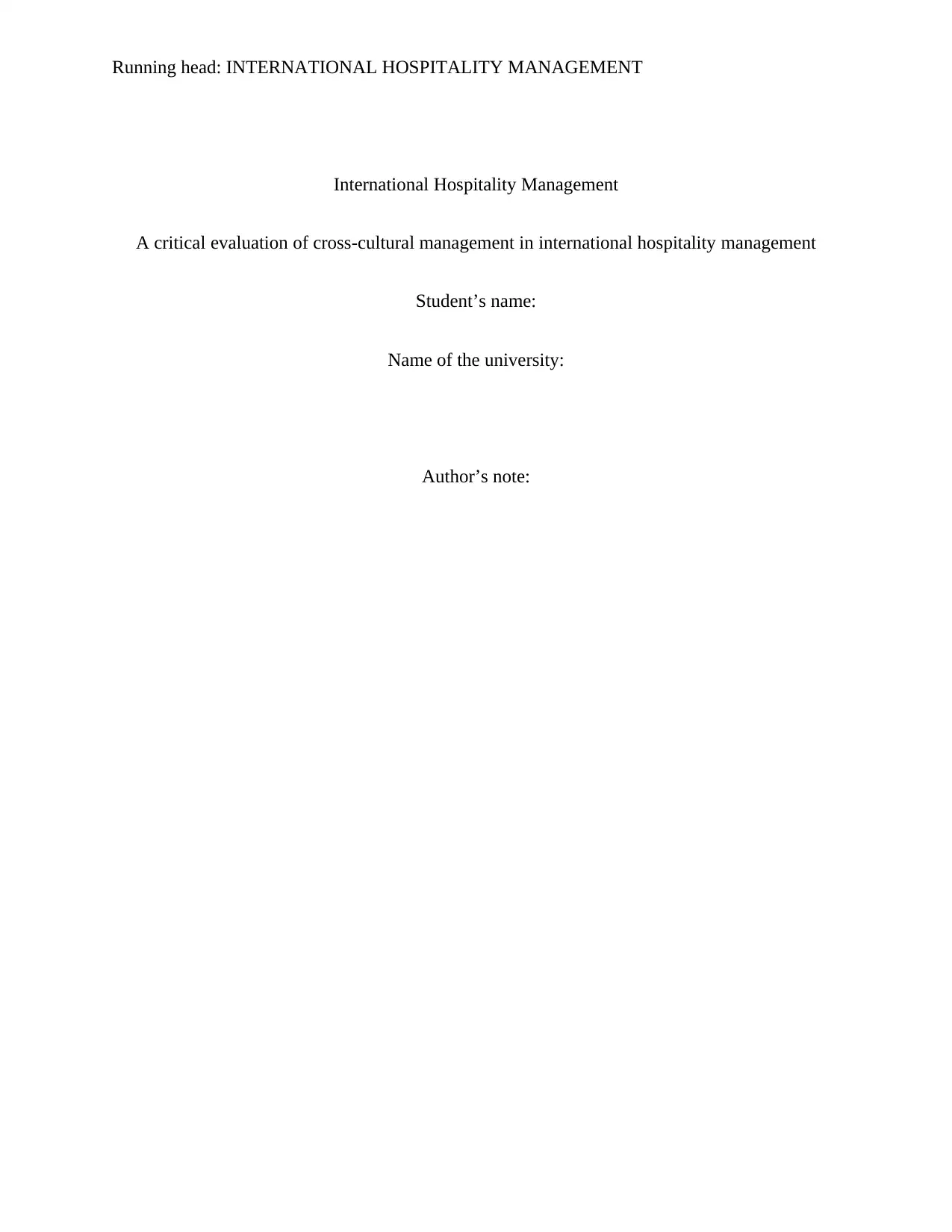
Running head: INTERNATIONAL HOSPITALITY MANAGEMENT
International Hospitality Management
A critical evaluation of cross-cultural management in international hospitality management
Student’s name:
Name of the university:
Author’s note:
International Hospitality Management
A critical evaluation of cross-cultural management in international hospitality management
Student’s name:
Name of the university:
Author’s note:
Paraphrase This Document
Need a fresh take? Get an instant paraphrase of this document with our AI Paraphraser
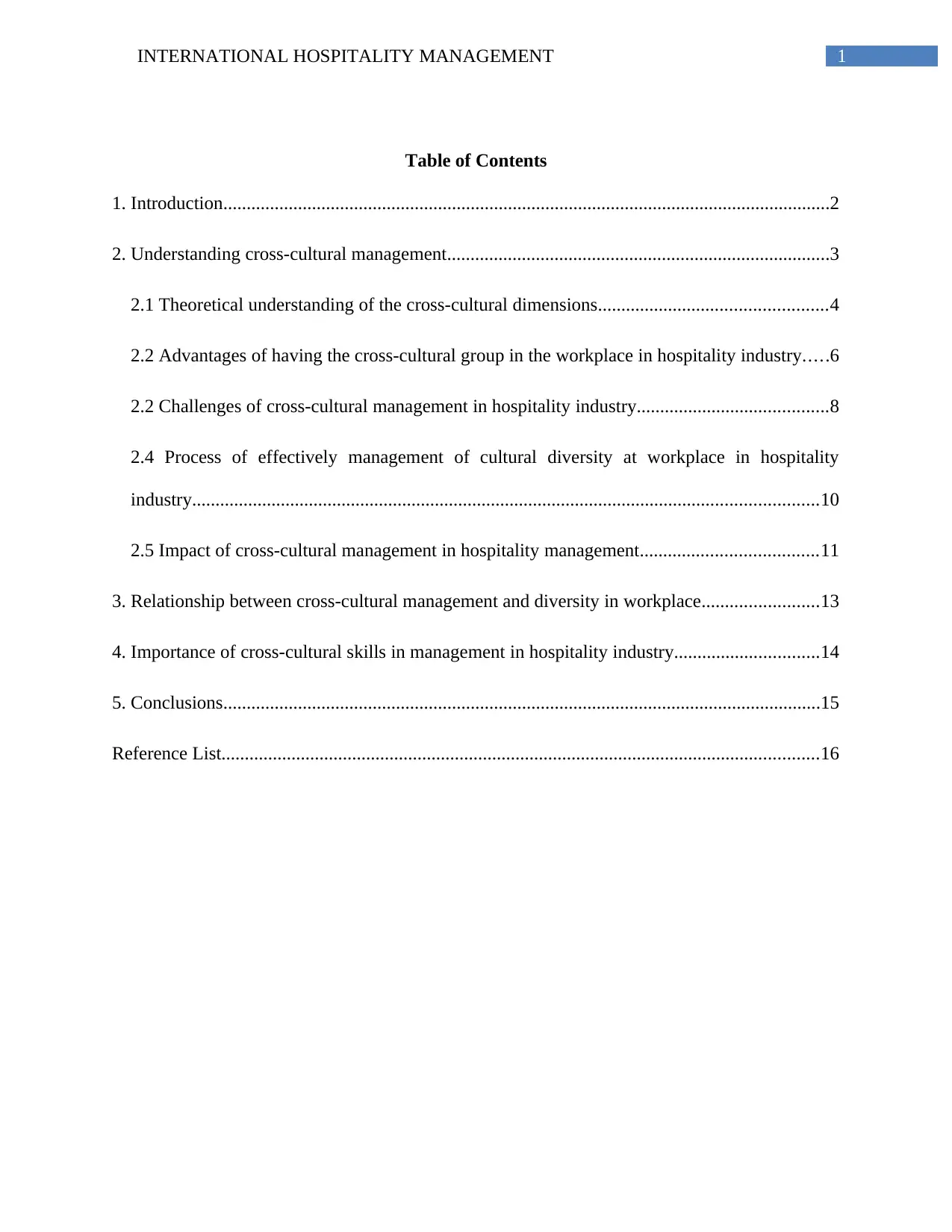
1INTERNATIONAL HOSPITALITY MANAGEMENT
Table of Contents
1. Introduction..................................................................................................................................2
2. Understanding cross-cultural management..................................................................................3
2.1 Theoretical understanding of the cross-cultural dimensions.................................................4
2.2 Advantages of having the cross-cultural group in the workplace in hospitality industry.....6
2.2 Challenges of cross-cultural management in hospitality industry.........................................8
2.4 Process of effectively management of cultural diversity at workplace in hospitality
industry......................................................................................................................................10
2.5 Impact of cross-cultural management in hospitality management......................................11
3. Relationship between cross-cultural management and diversity in workplace.........................13
4. Importance of cross-cultural skills in management in hospitality industry...............................14
5. Conclusions................................................................................................................................15
Reference List................................................................................................................................16
Table of Contents
1. Introduction..................................................................................................................................2
2. Understanding cross-cultural management..................................................................................3
2.1 Theoretical understanding of the cross-cultural dimensions.................................................4
2.2 Advantages of having the cross-cultural group in the workplace in hospitality industry.....6
2.2 Challenges of cross-cultural management in hospitality industry.........................................8
2.4 Process of effectively management of cultural diversity at workplace in hospitality
industry......................................................................................................................................10
2.5 Impact of cross-cultural management in hospitality management......................................11
3. Relationship between cross-cultural management and diversity in workplace.........................13
4. Importance of cross-cultural skills in management in hospitality industry...............................14
5. Conclusions................................................................................................................................15
Reference List................................................................................................................................16
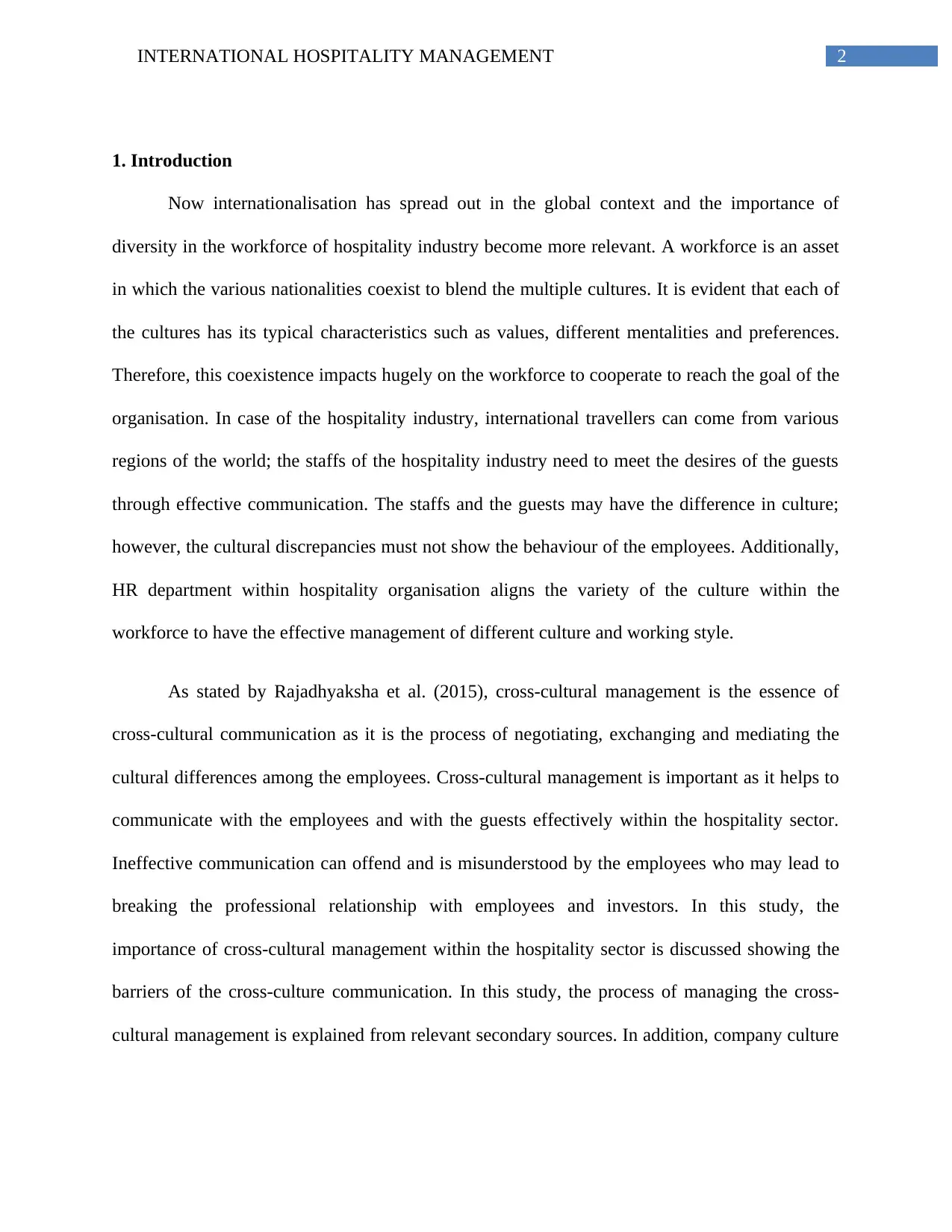
2INTERNATIONAL HOSPITALITY MANAGEMENT
1. Introduction
Now internationalisation has spread out in the global context and the importance of
diversity in the workforce of hospitality industry become more relevant. A workforce is an asset
in which the various nationalities coexist to blend the multiple cultures. It is evident that each of
the cultures has its typical characteristics such as values, different mentalities and preferences.
Therefore, this coexistence impacts hugely on the workforce to cooperate to reach the goal of the
organisation. In case of the hospitality industry, international travellers can come from various
regions of the world; the staffs of the hospitality industry need to meet the desires of the guests
through effective communication. The staffs and the guests may have the difference in culture;
however, the cultural discrepancies must not show the behaviour of the employees. Additionally,
HR department within hospitality organisation aligns the variety of the culture within the
workforce to have the effective management of different culture and working style.
As stated by Rajadhyaksha et al. (2015), cross-cultural management is the essence of
cross-cultural communication as it is the process of negotiating, exchanging and mediating the
cultural differences among the employees. Cross-cultural management is important as it helps to
communicate with the employees and with the guests effectively within the hospitality sector.
Ineffective communication can offend and is misunderstood by the employees who may lead to
breaking the professional relationship with employees and investors. In this study, the
importance of cross-cultural management within the hospitality sector is discussed showing the
barriers of the cross-culture communication. In this study, the process of managing the cross-
cultural management is explained from relevant secondary sources. In addition, company culture
1. Introduction
Now internationalisation has spread out in the global context and the importance of
diversity in the workforce of hospitality industry become more relevant. A workforce is an asset
in which the various nationalities coexist to blend the multiple cultures. It is evident that each of
the cultures has its typical characteristics such as values, different mentalities and preferences.
Therefore, this coexistence impacts hugely on the workforce to cooperate to reach the goal of the
organisation. In case of the hospitality industry, international travellers can come from various
regions of the world; the staffs of the hospitality industry need to meet the desires of the guests
through effective communication. The staffs and the guests may have the difference in culture;
however, the cultural discrepancies must not show the behaviour of the employees. Additionally,
HR department within hospitality organisation aligns the variety of the culture within the
workforce to have the effective management of different culture and working style.
As stated by Rajadhyaksha et al. (2015), cross-cultural management is the essence of
cross-cultural communication as it is the process of negotiating, exchanging and mediating the
cultural differences among the employees. Cross-cultural management is important as it helps to
communicate with the employees and with the guests effectively within the hospitality sector.
Ineffective communication can offend and is misunderstood by the employees who may lead to
breaking the professional relationship with employees and investors. In this study, the
importance of cross-cultural management within the hospitality sector is discussed showing the
barriers of the cross-culture communication. In this study, the process of managing the cross-
cultural management is explained from relevant secondary sources. In addition, company culture
⊘ This is a preview!⊘
Do you want full access?
Subscribe today to unlock all pages.

Trusted by 1+ million students worldwide
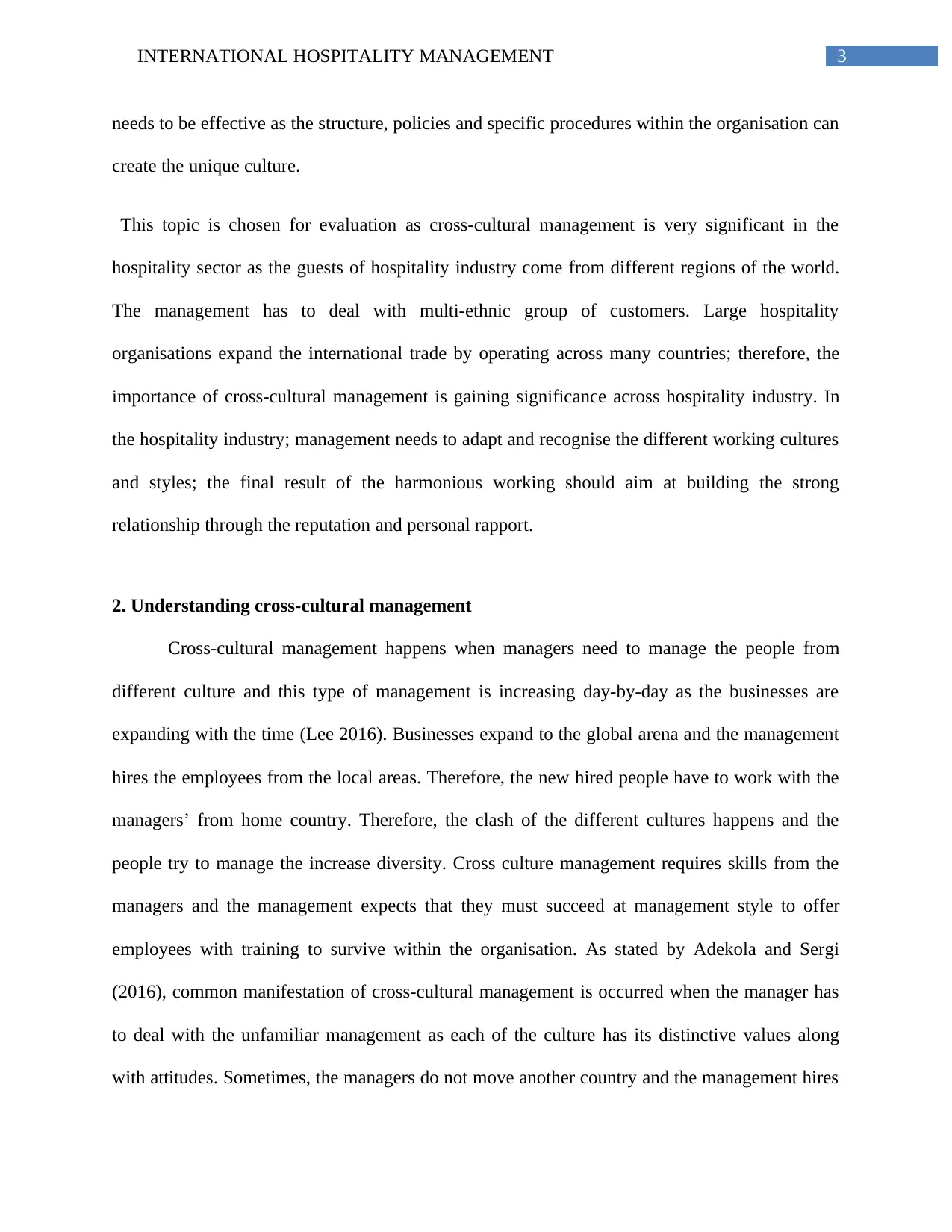
3INTERNATIONAL HOSPITALITY MANAGEMENT
needs to be effective as the structure, policies and specific procedures within the organisation can
create the unique culture.
This topic is chosen for evaluation as cross-cultural management is very significant in the
hospitality sector as the guests of hospitality industry come from different regions of the world.
The management has to deal with multi-ethnic group of customers. Large hospitality
organisations expand the international trade by operating across many countries; therefore, the
importance of cross-cultural management is gaining significance across hospitality industry. In
the hospitality industry; management needs to adapt and recognise the different working cultures
and styles; the final result of the harmonious working should aim at building the strong
relationship through the reputation and personal rapport.
2. Understanding cross-cultural management
Cross-cultural management happens when managers need to manage the people from
different culture and this type of management is increasing day-by-day as the businesses are
expanding with the time (Lee 2016). Businesses expand to the global arena and the management
hires the employees from the local areas. Therefore, the new hired people have to work with the
managers’ from home country. Therefore, the clash of the different cultures happens and the
people try to manage the increase diversity. Cross culture management requires skills from the
managers and the management expects that they must succeed at management style to offer
employees with training to survive within the organisation. As stated by Adekola and Sergi
(2016), common manifestation of cross-cultural management is occurred when the manager has
to deal with the unfamiliar management as each of the culture has its distinctive values along
with attitudes. Sometimes, the managers do not move another country and the management hires
needs to be effective as the structure, policies and specific procedures within the organisation can
create the unique culture.
This topic is chosen for evaluation as cross-cultural management is very significant in the
hospitality sector as the guests of hospitality industry come from different regions of the world.
The management has to deal with multi-ethnic group of customers. Large hospitality
organisations expand the international trade by operating across many countries; therefore, the
importance of cross-cultural management is gaining significance across hospitality industry. In
the hospitality industry; management needs to adapt and recognise the different working cultures
and styles; the final result of the harmonious working should aim at building the strong
relationship through the reputation and personal rapport.
2. Understanding cross-cultural management
Cross-cultural management happens when managers need to manage the people from
different culture and this type of management is increasing day-by-day as the businesses are
expanding with the time (Lee 2016). Businesses expand to the global arena and the management
hires the employees from the local areas. Therefore, the new hired people have to work with the
managers’ from home country. Therefore, the clash of the different cultures happens and the
people try to manage the increase diversity. Cross culture management requires skills from the
managers and the management expects that they must succeed at management style to offer
employees with training to survive within the organisation. As stated by Adekola and Sergi
(2016), common manifestation of cross-cultural management is occurred when the manager has
to deal with the unfamiliar management as each of the culture has its distinctive values along
with attitudes. Sometimes, the managers do not move another country and the management hires
Paraphrase This Document
Need a fresh take? Get an instant paraphrase of this document with our AI Paraphraser
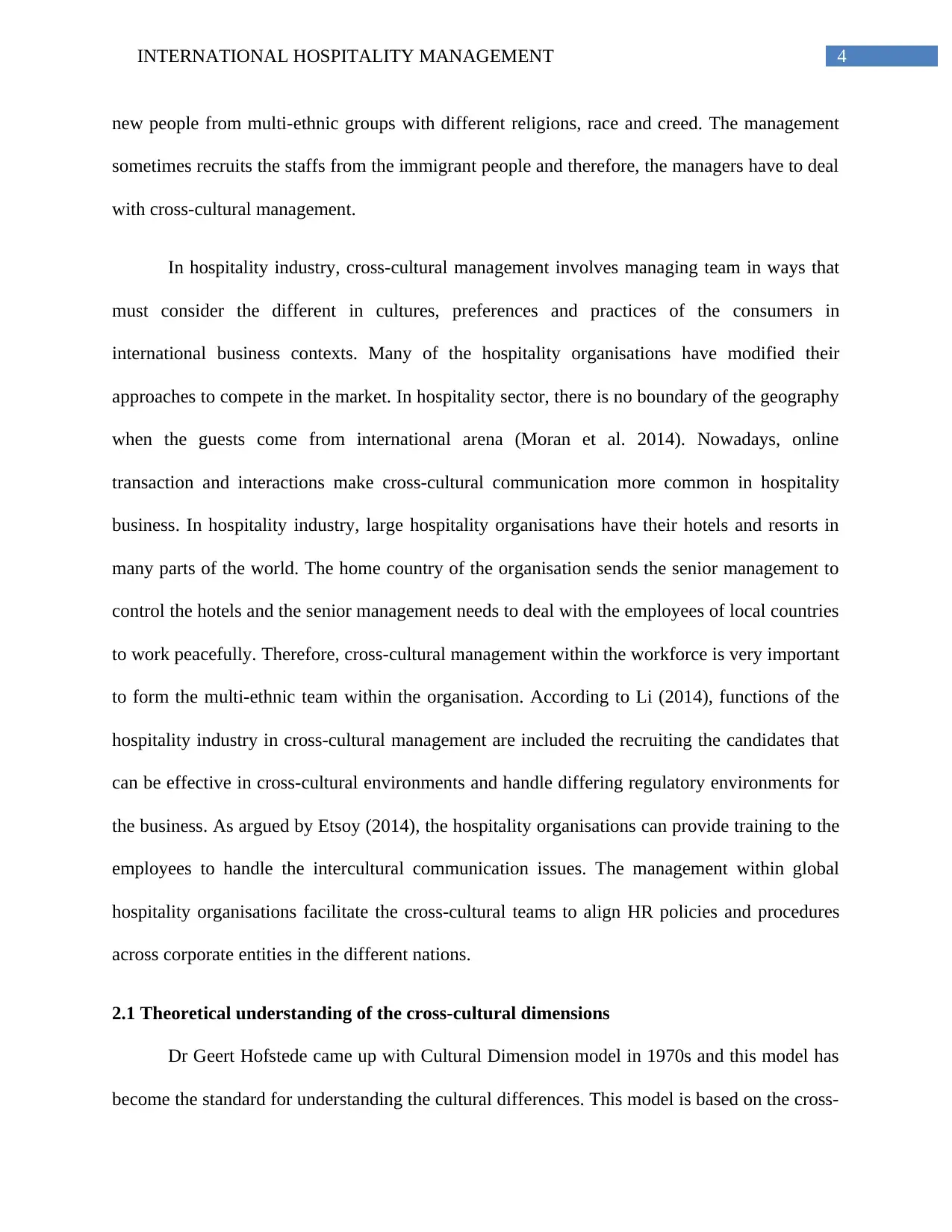
4INTERNATIONAL HOSPITALITY MANAGEMENT
new people from multi-ethnic groups with different religions, race and creed. The management
sometimes recruits the staffs from the immigrant people and therefore, the managers have to deal
with cross-cultural management.
In hospitality industry, cross-cultural management involves managing team in ways that
must consider the different in cultures, preferences and practices of the consumers in
international business contexts. Many of the hospitality organisations have modified their
approaches to compete in the market. In hospitality sector, there is no boundary of the geography
when the guests come from international arena (Moran et al. 2014). Nowadays, online
transaction and interactions make cross-cultural communication more common in hospitality
business. In hospitality industry, large hospitality organisations have their hotels and resorts in
many parts of the world. The home country of the organisation sends the senior management to
control the hotels and the senior management needs to deal with the employees of local countries
to work peacefully. Therefore, cross-cultural management within the workforce is very important
to form the multi-ethnic team within the organisation. According to Li (2014), functions of the
hospitality industry in cross-cultural management are included the recruiting the candidates that
can be effective in cross-cultural environments and handle differing regulatory environments for
the business. As argued by Etsoy (2014), the hospitality organisations can provide training to the
employees to handle the intercultural communication issues. The management within global
hospitality organisations facilitate the cross-cultural teams to align HR policies and procedures
across corporate entities in the different nations.
2.1 Theoretical understanding of the cross-cultural dimensions
Dr Geert Hofstede came up with Cultural Dimension model in 1970s and this model has
become the standard for understanding the cultural differences. This model is based on the cross-
new people from multi-ethnic groups with different religions, race and creed. The management
sometimes recruits the staffs from the immigrant people and therefore, the managers have to deal
with cross-cultural management.
In hospitality industry, cross-cultural management involves managing team in ways that
must consider the different in cultures, preferences and practices of the consumers in
international business contexts. Many of the hospitality organisations have modified their
approaches to compete in the market. In hospitality sector, there is no boundary of the geography
when the guests come from international arena (Moran et al. 2014). Nowadays, online
transaction and interactions make cross-cultural communication more common in hospitality
business. In hospitality industry, large hospitality organisations have their hotels and resorts in
many parts of the world. The home country of the organisation sends the senior management to
control the hotels and the senior management needs to deal with the employees of local countries
to work peacefully. Therefore, cross-cultural management within the workforce is very important
to form the multi-ethnic team within the organisation. According to Li (2014), functions of the
hospitality industry in cross-cultural management are included the recruiting the candidates that
can be effective in cross-cultural environments and handle differing regulatory environments for
the business. As argued by Etsoy (2014), the hospitality organisations can provide training to the
employees to handle the intercultural communication issues. The management within global
hospitality organisations facilitate the cross-cultural teams to align HR policies and procedures
across corporate entities in the different nations.
2.1 Theoretical understanding of the cross-cultural dimensions
Dr Geert Hofstede came up with Cultural Dimension model in 1970s and this model has
become the standard for understanding the cultural differences. This model is based on the cross-
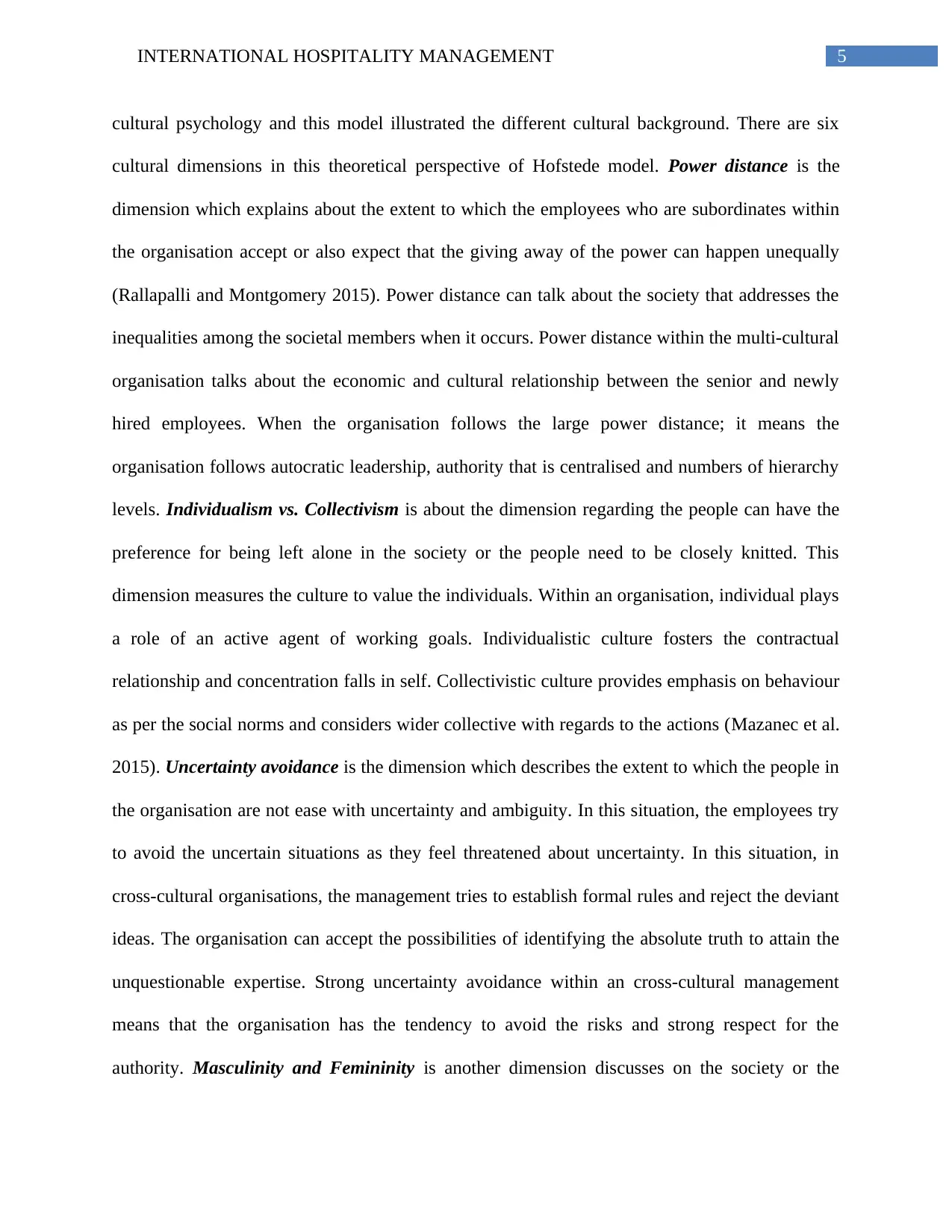
5INTERNATIONAL HOSPITALITY MANAGEMENT
cultural psychology and this model illustrated the different cultural background. There are six
cultural dimensions in this theoretical perspective of Hofstede model. Power distance is the
dimension which explains about the extent to which the employees who are subordinates within
the organisation accept or also expect that the giving away of the power can happen unequally
(Rallapalli and Montgomery 2015). Power distance can talk about the society that addresses the
inequalities among the societal members when it occurs. Power distance within the multi-cultural
organisation talks about the economic and cultural relationship between the senior and newly
hired employees. When the organisation follows the large power distance; it means the
organisation follows autocratic leadership, authority that is centralised and numbers of hierarchy
levels. Individualism vs. Collectivism is about the dimension regarding the people can have the
preference for being left alone in the society or the people need to be closely knitted. This
dimension measures the culture to value the individuals. Within an organisation, individual plays
a role of an active agent of working goals. Individualistic culture fosters the contractual
relationship and concentration falls in self. Collectivistic culture provides emphasis on behaviour
as per the social norms and considers wider collective with regards to the actions (Mazanec et al.
2015). Uncertainty avoidance is the dimension which describes the extent to which the people in
the organisation are not ease with uncertainty and ambiguity. In this situation, the employees try
to avoid the uncertain situations as they feel threatened about uncertainty. In this situation, in
cross-cultural organisations, the management tries to establish formal rules and reject the deviant
ideas. The organisation can accept the possibilities of identifying the absolute truth to attain the
unquestionable expertise. Strong uncertainty avoidance within an cross-cultural management
means that the organisation has the tendency to avoid the risks and strong respect for the
authority. Masculinity and Femininity is another dimension discusses on the society or the
cultural psychology and this model illustrated the different cultural background. There are six
cultural dimensions in this theoretical perspective of Hofstede model. Power distance is the
dimension which explains about the extent to which the employees who are subordinates within
the organisation accept or also expect that the giving away of the power can happen unequally
(Rallapalli and Montgomery 2015). Power distance can talk about the society that addresses the
inequalities among the societal members when it occurs. Power distance within the multi-cultural
organisation talks about the economic and cultural relationship between the senior and newly
hired employees. When the organisation follows the large power distance; it means the
organisation follows autocratic leadership, authority that is centralised and numbers of hierarchy
levels. Individualism vs. Collectivism is about the dimension regarding the people can have the
preference for being left alone in the society or the people need to be closely knitted. This
dimension measures the culture to value the individuals. Within an organisation, individual plays
a role of an active agent of working goals. Individualistic culture fosters the contractual
relationship and concentration falls in self. Collectivistic culture provides emphasis on behaviour
as per the social norms and considers wider collective with regards to the actions (Mazanec et al.
2015). Uncertainty avoidance is the dimension which describes the extent to which the people in
the organisation are not ease with uncertainty and ambiguity. In this situation, the employees try
to avoid the uncertain situations as they feel threatened about uncertainty. In this situation, in
cross-cultural organisations, the management tries to establish formal rules and reject the deviant
ideas. The organisation can accept the possibilities of identifying the absolute truth to attain the
unquestionable expertise. Strong uncertainty avoidance within an cross-cultural management
means that the organisation has the tendency to avoid the risks and strong respect for the
authority. Masculinity and Femininity is another dimension discusses on the society or the
⊘ This is a preview!⊘
Do you want full access?
Subscribe today to unlock all pages.

Trusted by 1+ million students worldwide
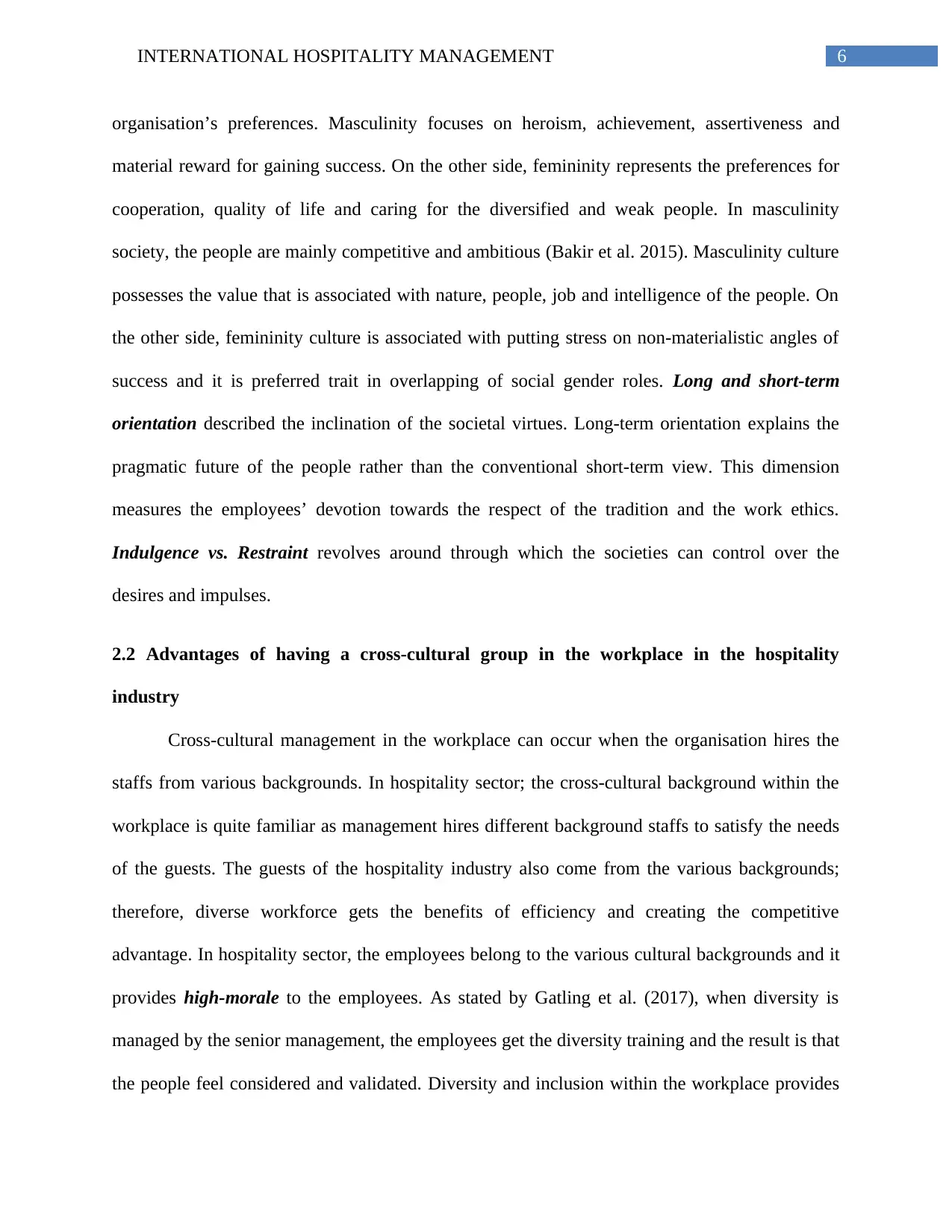
6INTERNATIONAL HOSPITALITY MANAGEMENT
organisation’s preferences. Masculinity focuses on heroism, achievement, assertiveness and
material reward for gaining success. On the other side, femininity represents the preferences for
cooperation, quality of life and caring for the diversified and weak people. In masculinity
society, the people are mainly competitive and ambitious (Bakir et al. 2015). Masculinity culture
possesses the value that is associated with nature, people, job and intelligence of the people. On
the other side, femininity culture is associated with putting stress on non-materialistic angles of
success and it is preferred trait in overlapping of social gender roles. Long and short-term
orientation described the inclination of the societal virtues. Long-term orientation explains the
pragmatic future of the people rather than the conventional short-term view. This dimension
measures the employees’ devotion towards the respect of the tradition and the work ethics.
Indulgence vs. Restraint revolves around through which the societies can control over the
desires and impulses.
2.2 Advantages of having a cross-cultural group in the workplace in the hospitality
industry
Cross-cultural management in the workplace can occur when the organisation hires the
staffs from various backgrounds. In hospitality sector; the cross-cultural background within the
workplace is quite familiar as management hires different background staffs to satisfy the needs
of the guests. The guests of the hospitality industry also come from the various backgrounds;
therefore, diverse workforce gets the benefits of efficiency and creating the competitive
advantage. In hospitality sector, the employees belong to the various cultural backgrounds and it
provides high-morale to the employees. As stated by Gatling et al. (2017), when diversity is
managed by the senior management, the employees get the diversity training and the result is that
the people feel considered and validated. Diversity and inclusion within the workplace provides
organisation’s preferences. Masculinity focuses on heroism, achievement, assertiveness and
material reward for gaining success. On the other side, femininity represents the preferences for
cooperation, quality of life and caring for the diversified and weak people. In masculinity
society, the people are mainly competitive and ambitious (Bakir et al. 2015). Masculinity culture
possesses the value that is associated with nature, people, job and intelligence of the people. On
the other side, femininity culture is associated with putting stress on non-materialistic angles of
success and it is preferred trait in overlapping of social gender roles. Long and short-term
orientation described the inclination of the societal virtues. Long-term orientation explains the
pragmatic future of the people rather than the conventional short-term view. This dimension
measures the employees’ devotion towards the respect of the tradition and the work ethics.
Indulgence vs. Restraint revolves around through which the societies can control over the
desires and impulses.
2.2 Advantages of having a cross-cultural group in the workplace in the hospitality
industry
Cross-cultural management in the workplace can occur when the organisation hires the
staffs from various backgrounds. In hospitality sector; the cross-cultural background within the
workplace is quite familiar as management hires different background staffs to satisfy the needs
of the guests. The guests of the hospitality industry also come from the various backgrounds;
therefore, diverse workforce gets the benefits of efficiency and creating the competitive
advantage. In hospitality sector, the employees belong to the various cultural backgrounds and it
provides high-morale to the employees. As stated by Gatling et al. (2017), when diversity is
managed by the senior management, the employees get the diversity training and the result is that
the people feel considered and validated. Diversity and inclusion within the workplace provides
Paraphrase This Document
Need a fresh take? Get an instant paraphrase of this document with our AI Paraphraser
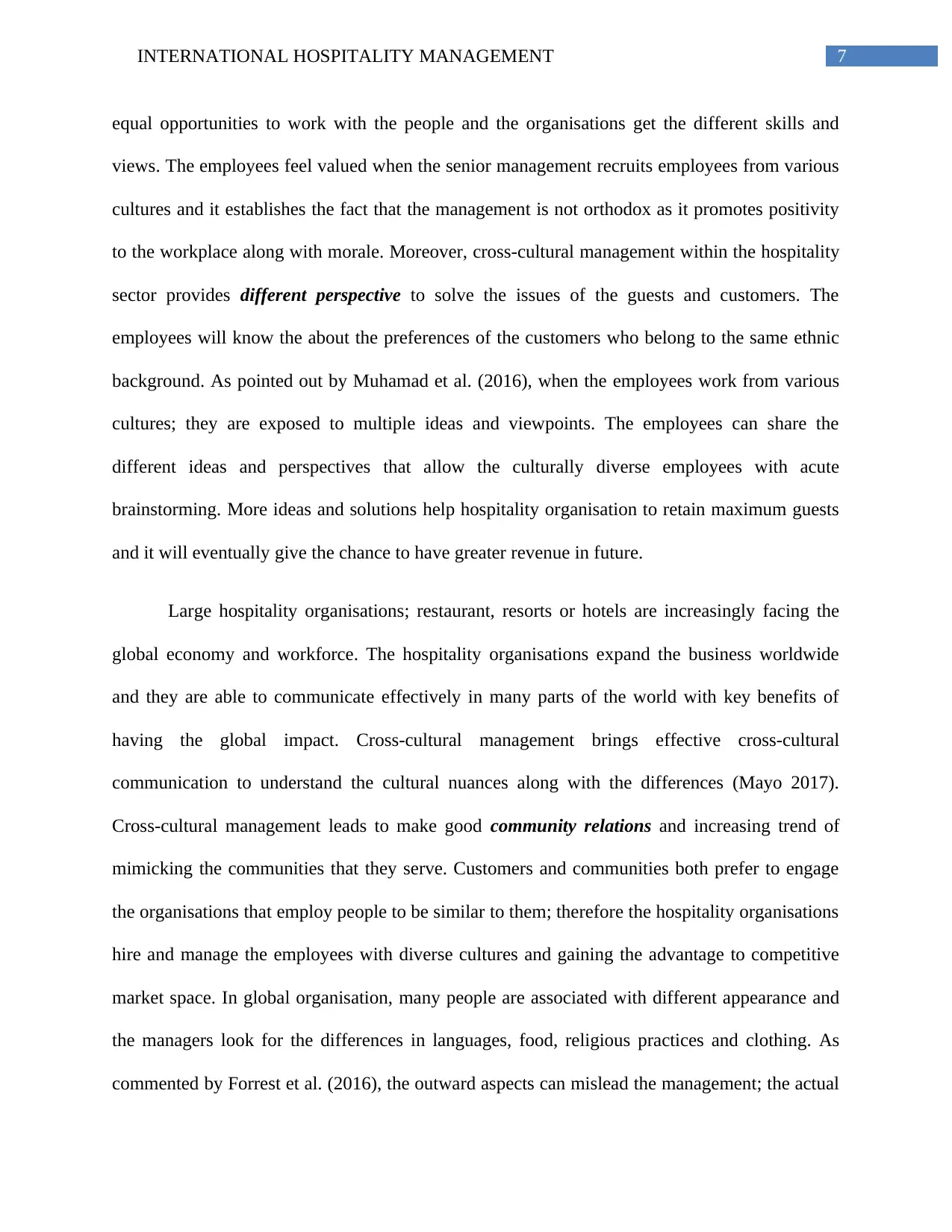
7INTERNATIONAL HOSPITALITY MANAGEMENT
equal opportunities to work with the people and the organisations get the different skills and
views. The employees feel valued when the senior management recruits employees from various
cultures and it establishes the fact that the management is not orthodox as it promotes positivity
to the workplace along with morale. Moreover, cross-cultural management within the hospitality
sector provides different perspective to solve the issues of the guests and customers. The
employees will know the about the preferences of the customers who belong to the same ethnic
background. As pointed out by Muhamad et al. (2016), when the employees work from various
cultures; they are exposed to multiple ideas and viewpoints. The employees can share the
different ideas and perspectives that allow the culturally diverse employees with acute
brainstorming. More ideas and solutions help hospitality organisation to retain maximum guests
and it will eventually give the chance to have greater revenue in future.
Large hospitality organisations; restaurant, resorts or hotels are increasingly facing the
global economy and workforce. The hospitality organisations expand the business worldwide
and they are able to communicate effectively in many parts of the world with key benefits of
having the global impact. Cross-cultural management brings effective cross-cultural
communication to understand the cultural nuances along with the differences (Mayo 2017).
Cross-cultural management leads to make good community relations and increasing trend of
mimicking the communities that they serve. Customers and communities both prefer to engage
the organisations that employ people to be similar to them; therefore the hospitality organisations
hire and manage the employees with diverse cultures and gaining the advantage to competitive
market space. In global organisation, many people are associated with different appearance and
the managers look for the differences in languages, food, religious practices and clothing. As
commented by Forrest et al. (2016), the outward aspects can mislead the management; the actual
equal opportunities to work with the people and the organisations get the different skills and
views. The employees feel valued when the senior management recruits employees from various
cultures and it establishes the fact that the management is not orthodox as it promotes positivity
to the workplace along with morale. Moreover, cross-cultural management within the hospitality
sector provides different perspective to solve the issues of the guests and customers. The
employees will know the about the preferences of the customers who belong to the same ethnic
background. As pointed out by Muhamad et al. (2016), when the employees work from various
cultures; they are exposed to multiple ideas and viewpoints. The employees can share the
different ideas and perspectives that allow the culturally diverse employees with acute
brainstorming. More ideas and solutions help hospitality organisation to retain maximum guests
and it will eventually give the chance to have greater revenue in future.
Large hospitality organisations; restaurant, resorts or hotels are increasingly facing the
global economy and workforce. The hospitality organisations expand the business worldwide
and they are able to communicate effectively in many parts of the world with key benefits of
having the global impact. Cross-cultural management brings effective cross-cultural
communication to understand the cultural nuances along with the differences (Mayo 2017).
Cross-cultural management leads to make good community relations and increasing trend of
mimicking the communities that they serve. Customers and communities both prefer to engage
the organisations that employ people to be similar to them; therefore the hospitality organisations
hire and manage the employees with diverse cultures and gaining the advantage to competitive
market space. In global organisation, many people are associated with different appearance and
the managers look for the differences in languages, food, religious practices and clothing. As
commented by Forrest et al. (2016), the outward aspects can mislead the management; the actual
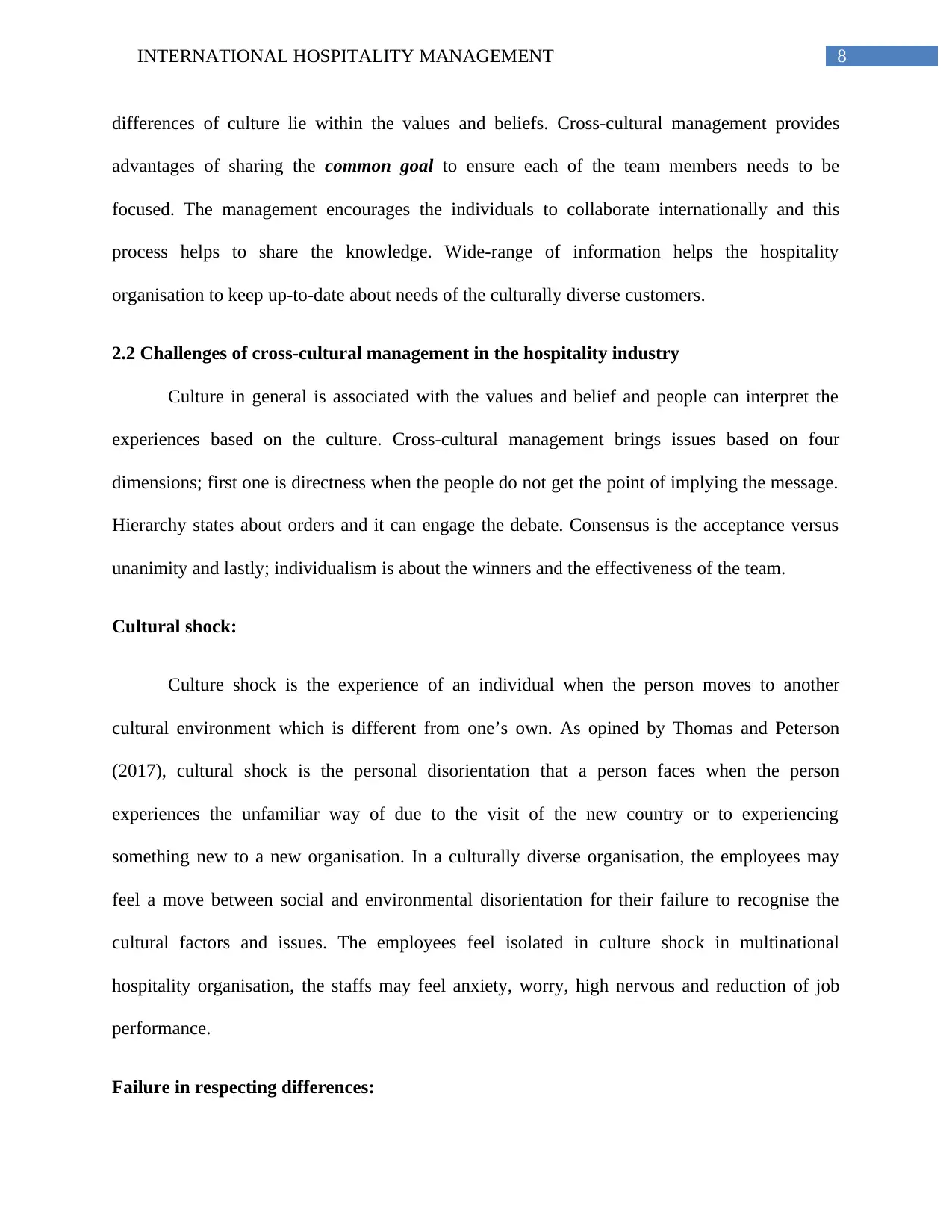
8INTERNATIONAL HOSPITALITY MANAGEMENT
differences of culture lie within the values and beliefs. Cross-cultural management provides
advantages of sharing the common goal to ensure each of the team members needs to be
focused. The management encourages the individuals to collaborate internationally and this
process helps to share the knowledge. Wide-range of information helps the hospitality
organisation to keep up-to-date about needs of the culturally diverse customers.
2.2 Challenges of cross-cultural management in the hospitality industry
Culture in general is associated with the values and belief and people can interpret the
experiences based on the culture. Cross-cultural management brings issues based on four
dimensions; first one is directness when the people do not get the point of implying the message.
Hierarchy states about orders and it can engage the debate. Consensus is the acceptance versus
unanimity and lastly; individualism is about the winners and the effectiveness of the team.
Cultural shock:
Culture shock is the experience of an individual when the person moves to another
cultural environment which is different from one’s own. As opined by Thomas and Peterson
(2017), cultural shock is the personal disorientation that a person faces when the person
experiences the unfamiliar way of due to the visit of the new country or to experiencing
something new to a new organisation. In a culturally diverse organisation, the employees may
feel a move between social and environmental disorientation for their failure to recognise the
cultural factors and issues. The employees feel isolated in culture shock in multinational
hospitality organisation, the staffs may feel anxiety, worry, high nervous and reduction of job
performance.
Failure in respecting differences:
differences of culture lie within the values and beliefs. Cross-cultural management provides
advantages of sharing the common goal to ensure each of the team members needs to be
focused. The management encourages the individuals to collaborate internationally and this
process helps to share the knowledge. Wide-range of information helps the hospitality
organisation to keep up-to-date about needs of the culturally diverse customers.
2.2 Challenges of cross-cultural management in the hospitality industry
Culture in general is associated with the values and belief and people can interpret the
experiences based on the culture. Cross-cultural management brings issues based on four
dimensions; first one is directness when the people do not get the point of implying the message.
Hierarchy states about orders and it can engage the debate. Consensus is the acceptance versus
unanimity and lastly; individualism is about the winners and the effectiveness of the team.
Cultural shock:
Culture shock is the experience of an individual when the person moves to another
cultural environment which is different from one’s own. As opined by Thomas and Peterson
(2017), cultural shock is the personal disorientation that a person faces when the person
experiences the unfamiliar way of due to the visit of the new country or to experiencing
something new to a new organisation. In a culturally diverse organisation, the employees may
feel a move between social and environmental disorientation for their failure to recognise the
cultural factors and issues. The employees feel isolated in culture shock in multinational
hospitality organisation, the staffs may feel anxiety, worry, high nervous and reduction of job
performance.
Failure in respecting differences:
⊘ This is a preview!⊘
Do you want full access?
Subscribe today to unlock all pages.

Trusted by 1+ million students worldwide
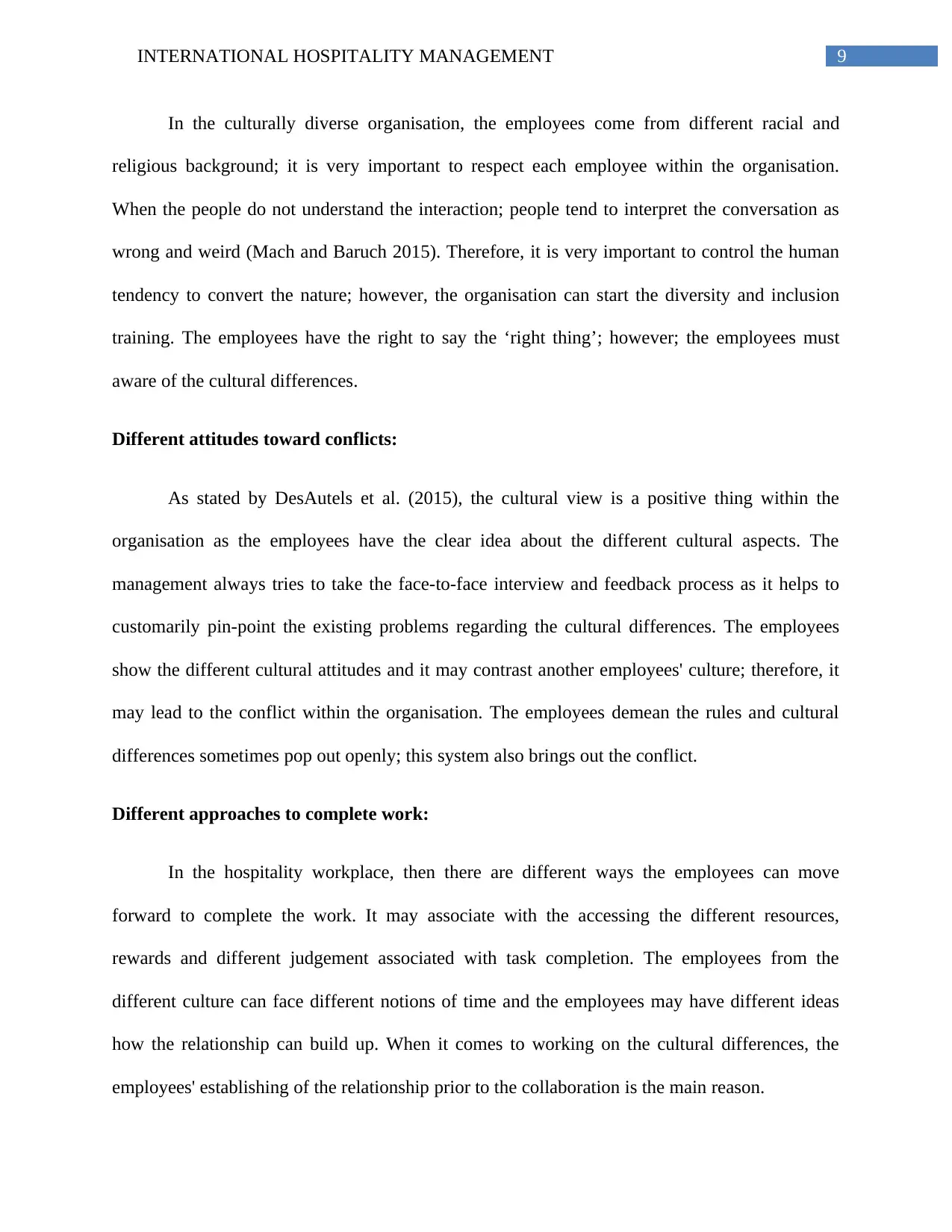
9INTERNATIONAL HOSPITALITY MANAGEMENT
In the culturally diverse organisation, the employees come from different racial and
religious background; it is very important to respect each employee within the organisation.
When the people do not understand the interaction; people tend to interpret the conversation as
wrong and weird (Mach and Baruch 2015). Therefore, it is very important to control the human
tendency to convert the nature; however, the organisation can start the diversity and inclusion
training. The employees have the right to say the ‘right thing’; however; the employees must
aware of the cultural differences.
Different attitudes toward conflicts:
As stated by DesAutels et al. (2015), the cultural view is a positive thing within the
organisation as the employees have the clear idea about the different cultural aspects. The
management always tries to take the face-to-face interview and feedback process as it helps to
customarily pin-point the existing problems regarding the cultural differences. The employees
show the different cultural attitudes and it may contrast another employees' culture; therefore, it
may lead to the conflict within the organisation. The employees demean the rules and cultural
differences sometimes pop out openly; this system also brings out the conflict.
Different approaches to complete work:
In the hospitality workplace, then there are different ways the employees can move
forward to complete the work. It may associate with the accessing the different resources,
rewards and different judgement associated with task completion. The employees from the
different culture can face different notions of time and the employees may have different ideas
how the relationship can build up. When it comes to working on the cultural differences, the
employees' establishing of the relationship prior to the collaboration is the main reason.
In the culturally diverse organisation, the employees come from different racial and
religious background; it is very important to respect each employee within the organisation.
When the people do not understand the interaction; people tend to interpret the conversation as
wrong and weird (Mach and Baruch 2015). Therefore, it is very important to control the human
tendency to convert the nature; however, the organisation can start the diversity and inclusion
training. The employees have the right to say the ‘right thing’; however; the employees must
aware of the cultural differences.
Different attitudes toward conflicts:
As stated by DesAutels et al. (2015), the cultural view is a positive thing within the
organisation as the employees have the clear idea about the different cultural aspects. The
management always tries to take the face-to-face interview and feedback process as it helps to
customarily pin-point the existing problems regarding the cultural differences. The employees
show the different cultural attitudes and it may contrast another employees' culture; therefore, it
may lead to the conflict within the organisation. The employees demean the rules and cultural
differences sometimes pop out openly; this system also brings out the conflict.
Different approaches to complete work:
In the hospitality workplace, then there are different ways the employees can move
forward to complete the work. It may associate with the accessing the different resources,
rewards and different judgement associated with task completion. The employees from the
different culture can face different notions of time and the employees may have different ideas
how the relationship can build up. When it comes to working on the cultural differences, the
employees' establishing of the relationship prior to the collaboration is the main reason.
Paraphrase This Document
Need a fresh take? Get an instant paraphrase of this document with our AI Paraphraser
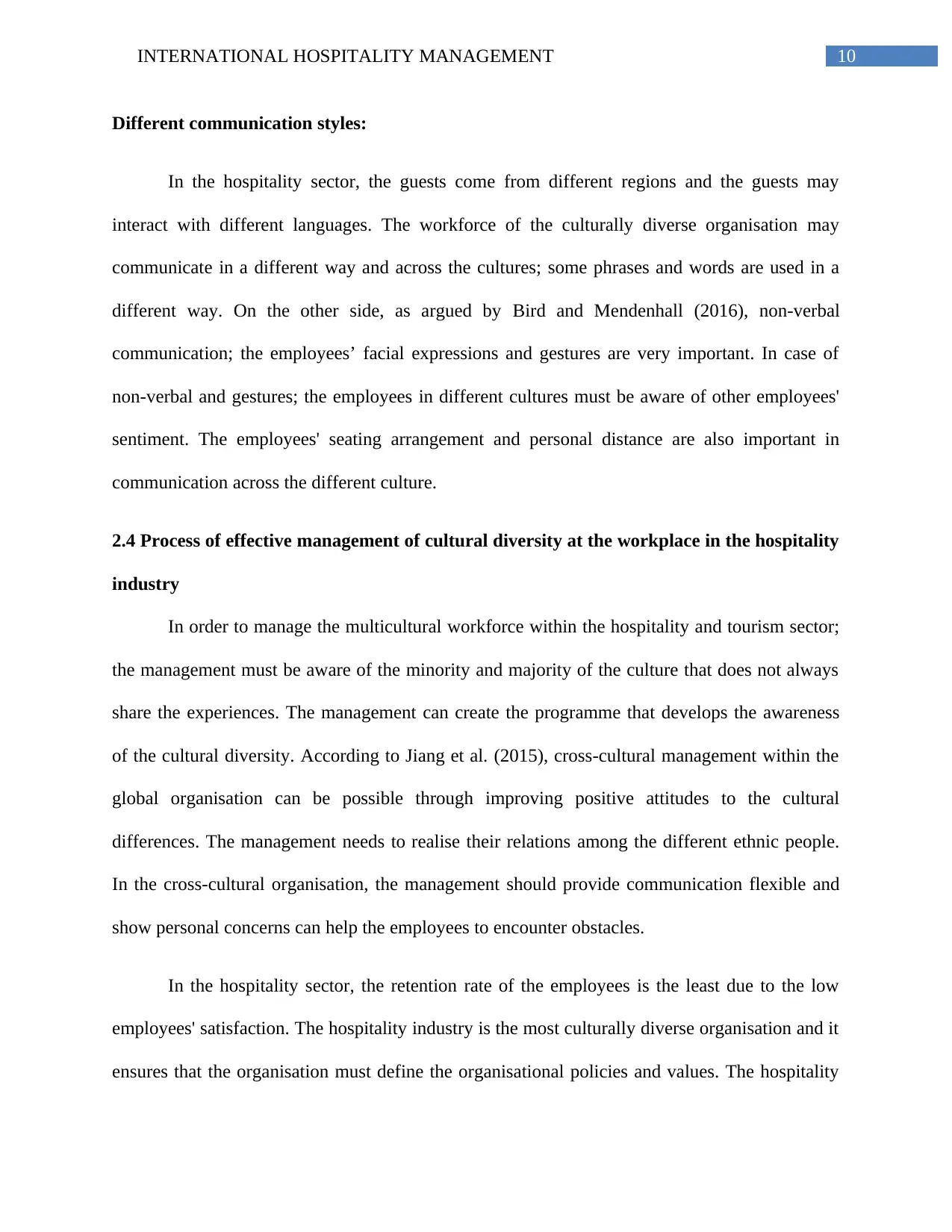
10INTERNATIONAL HOSPITALITY MANAGEMENT
Different communication styles:
In the hospitality sector, the guests come from different regions and the guests may
interact with different languages. The workforce of the culturally diverse organisation may
communicate in a different way and across the cultures; some phrases and words are used in a
different way. On the other side, as argued by Bird and Mendenhall (2016), non-verbal
communication; the employees’ facial expressions and gestures are very important. In case of
non-verbal and gestures; the employees in different cultures must be aware of other employees'
sentiment. The employees' seating arrangement and personal distance are also important in
communication across the different culture.
2.4 Process of effective management of cultural diversity at the workplace in the hospitality
industry
In order to manage the multicultural workforce within the hospitality and tourism sector;
the management must be aware of the minority and majority of the culture that does not always
share the experiences. The management can create the programme that develops the awareness
of the cultural diversity. According to Jiang et al. (2015), cross-cultural management within the
global organisation can be possible through improving positive attitudes to the cultural
differences. The management needs to realise their relations among the different ethnic people.
In the cross-cultural organisation, the management should provide communication flexible and
show personal concerns can help the employees to encounter obstacles.
In the hospitality sector, the retention rate of the employees is the least due to the low
employees' satisfaction. The hospitality industry is the most culturally diverse organisation and it
ensures that the organisation must define the organisational policies and values. The hospitality
Different communication styles:
In the hospitality sector, the guests come from different regions and the guests may
interact with different languages. The workforce of the culturally diverse organisation may
communicate in a different way and across the cultures; some phrases and words are used in a
different way. On the other side, as argued by Bird and Mendenhall (2016), non-verbal
communication; the employees’ facial expressions and gestures are very important. In case of
non-verbal and gestures; the employees in different cultures must be aware of other employees'
sentiment. The employees' seating arrangement and personal distance are also important in
communication across the different culture.
2.4 Process of effective management of cultural diversity at the workplace in the hospitality
industry
In order to manage the multicultural workforce within the hospitality and tourism sector;
the management must be aware of the minority and majority of the culture that does not always
share the experiences. The management can create the programme that develops the awareness
of the cultural diversity. According to Jiang et al. (2015), cross-cultural management within the
global organisation can be possible through improving positive attitudes to the cultural
differences. The management needs to realise their relations among the different ethnic people.
In the cross-cultural organisation, the management should provide communication flexible and
show personal concerns can help the employees to encounter obstacles.
In the hospitality sector, the retention rate of the employees is the least due to the low
employees' satisfaction. The hospitality industry is the most culturally diverse organisation and it
ensures that the organisation must define the organisational policies and values. The hospitality
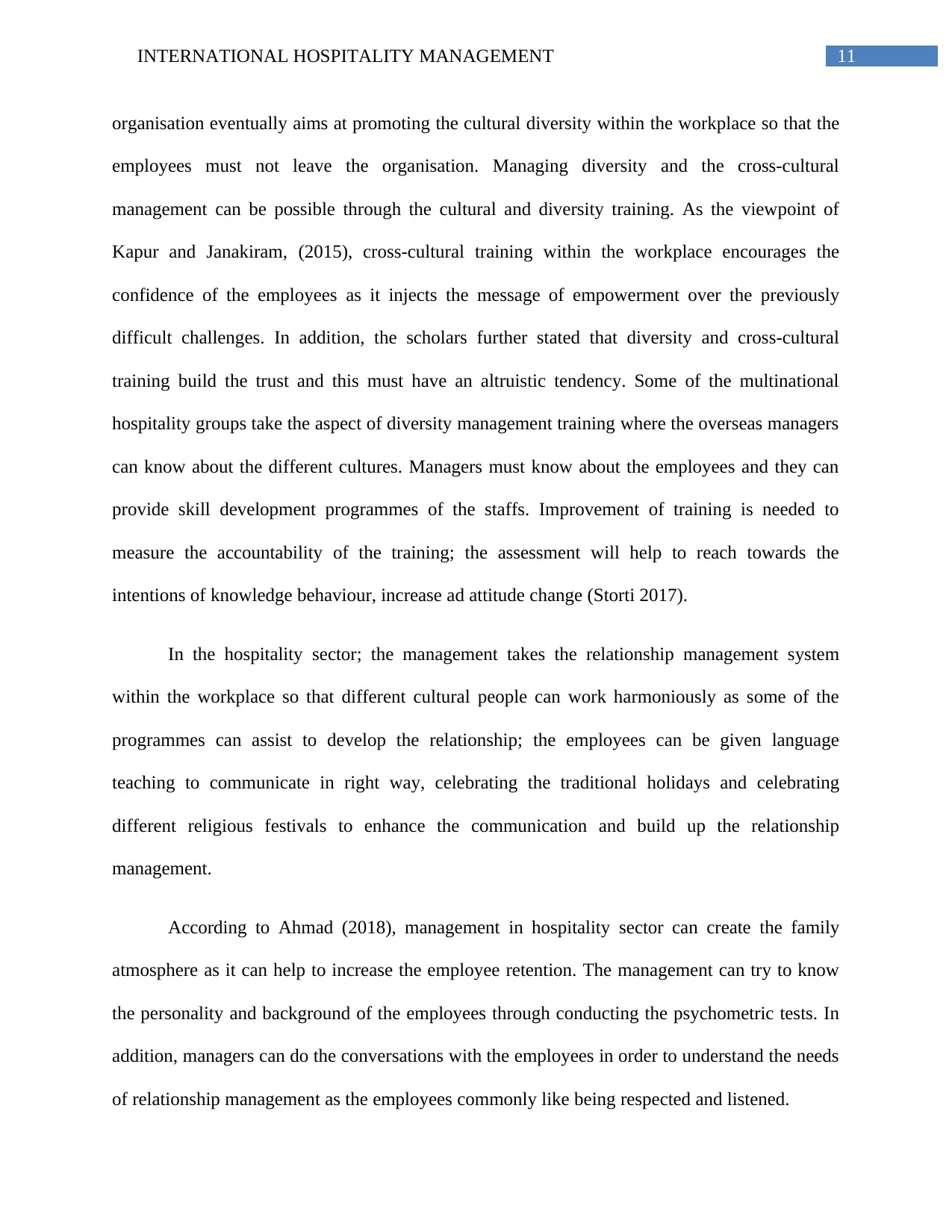
11INTERNATIONAL HOSPITALITY MANAGEMENT
organisation eventually aims at promoting the cultural diversity within the workplace so that the
employees must not leave the organisation. Managing diversity and the cross-cultural
management can be possible through the cultural and diversity training. As the viewpoint of
Kapur and Janakiram, (2015), cross-cultural training within the workplace encourages the
confidence of the employees as it injects the message of empowerment over the previously
difficult challenges. In addition, the scholars further stated that diversity and cross-cultural
training build the trust and this must have an altruistic tendency. Some of the multinational
hospitality groups take the aspect of diversity management training where the overseas managers
can know about the different cultures. Managers must know about the employees and they can
provide skill development programmes of the staffs. Improvement of training is needed to
measure the accountability of the training; the assessment will help to reach towards the
intentions of knowledge behaviour, increase ad attitude change (Storti 2017).
In the hospitality sector; the management takes the relationship management system
within the workplace so that different cultural people can work harmoniously as some of the
programmes can assist to develop the relationship; the employees can be given language
teaching to communicate in right way, celebrating the traditional holidays and celebrating
different religious festivals to enhance the communication and build up the relationship
management.
According to Ahmad (2018), management in hospitality sector can create the family
atmosphere as it can help to increase the employee retention. The management can try to know
the personality and background of the employees through conducting the psychometric tests. In
addition, managers can do the conversations with the employees in order to understand the needs
of relationship management as the employees commonly like being respected and listened.
organisation eventually aims at promoting the cultural diversity within the workplace so that the
employees must not leave the organisation. Managing diversity and the cross-cultural
management can be possible through the cultural and diversity training. As the viewpoint of
Kapur and Janakiram, (2015), cross-cultural training within the workplace encourages the
confidence of the employees as it injects the message of empowerment over the previously
difficult challenges. In addition, the scholars further stated that diversity and cross-cultural
training build the trust and this must have an altruistic tendency. Some of the multinational
hospitality groups take the aspect of diversity management training where the overseas managers
can know about the different cultures. Managers must know about the employees and they can
provide skill development programmes of the staffs. Improvement of training is needed to
measure the accountability of the training; the assessment will help to reach towards the
intentions of knowledge behaviour, increase ad attitude change (Storti 2017).
In the hospitality sector; the management takes the relationship management system
within the workplace so that different cultural people can work harmoniously as some of the
programmes can assist to develop the relationship; the employees can be given language
teaching to communicate in right way, celebrating the traditional holidays and celebrating
different religious festivals to enhance the communication and build up the relationship
management.
According to Ahmad (2018), management in hospitality sector can create the family
atmosphere as it can help to increase the employee retention. The management can try to know
the personality and background of the employees through conducting the psychometric tests. In
addition, managers can do the conversations with the employees in order to understand the needs
of relationship management as the employees commonly like being respected and listened.
⊘ This is a preview!⊘
Do you want full access?
Subscribe today to unlock all pages.

Trusted by 1+ million students worldwide
1 out of 21
Related Documents
Your All-in-One AI-Powered Toolkit for Academic Success.
+13062052269
info@desklib.com
Available 24*7 on WhatsApp / Email
![[object Object]](/_next/static/media/star-bottom.7253800d.svg)
Unlock your academic potential
Copyright © 2020–2025 A2Z Services. All Rights Reserved. Developed and managed by ZUCOL.



